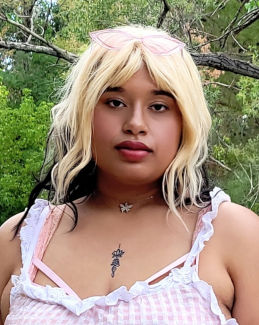
Catch the fair one
By Dharma Lemon
Catch the Fair One (Kubota Wladyka, 2021) follows a young Native woman named Kaylee (Kali Reyes). She lives in a shelter and works at a diner but all we see at first is she is sleeping with a razor in her mouth clearly haunted by something, Kaylee is still, even subconsciously practicing boxing despite having quit years prior. To the viewer these are the first signs Kaylee is getting ready to fight a bloody battle. It is soon revealed that Kaylee’s sister (Mainaku Borrero) went missing leading her to quit boxing due to pain and guilt she felt. She takes it upon herself to do what law enforcement isn’t doing and look for her sister. Kali K.O. Reyes’ heart-wrenching believability not only makes for an outstanding film but it also tells a story of agency. Kali, as a woman, knows what other women know. That in this world there are very few safe spaces for us.
There is a scene in the film where Kaylee comes face to face with her sister’s captures in a dingy basement. Outside it is a cold, snowy, wasteland clearly in the middle of nowhere. She wakes up and pleads for the location of her sister. One of the men in the dimly lit room alludes to the fact that no one is going to look for her sister.
A common misconception of the viewer at this point in the film is that no one takes her seriously because of her exterior. It’s easy to assume as the viewer that it would be her tattooed, hard body appearance. This was clearly not Kali’s intention when writing this film. Otherwise the scene where we pan out to a wall of missing women would also show family members with an unapproachable demeanor, furrowed brows, and washboard thick abs. Instead the film is saying that women are often not taken seriously as a whole. The horrible events that can happen to women don’t trigger cops to run and catch the bad guy. Instead it triggers disbelief or skepticism.
I know this to be true because I have seen it happen to my own mother. My mom, who was assaulted by a man in our house, was laughed at, and ridiculed while being questioned by law enforcement. I was handcuffed when I first got hit by a man I was dating while he got to tell his side of the story. The whole nation watched Cheryl Araujo get demonized by the media. She was vilified over seeking justice for her assault in a bar by four men. People watched night after night in voyeuristic joy as she was bombarded with a heavy amount of doubt. Even though the men were charged, the public still questioned her for years until it led to her eventual death.
In various cultures and countries women are constantly looked at as the underdog. This is why Catch The Fair One is essential for all marginalized groups to watch. Kaylee’s character is someone that all women desperately need. She is what I wanted so badly to be after my own assaults. The unbarred and unrelenting rage channeling rightful revenge in the only way she knows how.
It’s empowering how the film confronts the anger that stems from being taken advantage of and the guilt that is present throughout the whole process. For any woman who watches this film Kaylee is our hope. We cheer her on, we want so badly for her to succeed. We want so desperately to get justice .
One side of the coin says that this is film does a better job at talking about human trafficking than its male-led counterparts. For example You Were Never Really Here (Ramsay, 2017) follows Joe (Joaquin Phoenix), a war veteran with PTSD who helps bring young trafficked women to freedom. While You Were Never Really Here is a harrowing masterpiece I grasp at straws to critique , I will acknowledge that neither Joe nor Phoenix have agency to play this part of our white knight. Ultimately it’s unfortunate to acknowledge but there is a disconnect from his depressive PTSD unpredictable episodes and the subject of human trafficking as a whole. Phoenix’s performance is so devastating you can’t help but feel heartbroken for him more than the women who are seen in a scene dead in the back of the caravan. Catch The Fair One leaves a different taste in your mouth because you know Kaylee the character and Kali Reyes both have experienced the psychological damage that comes with the territory of growing up in a world where you encounter many people seeking to take advantage of you.
Catch The Fair One is part of a new wave of feminist Revenge films. If compared to its Female counterpart, Promising Young Woman (Fennel, 2020), the film can start to take on nuanced themes that raise the question: What are we supposed to get out of the film? The answer could be as simple as catharsis for other victims to fantasize about their own predators getting waterboarded to death. But as a victim of multiple assaults there is underlying guilt that films like this trigger in me. It looms in the background and usually comes on all at once, when the film is finished.
This is because morally I have never believed in the concept of , “An eye for an eye”. We as survivors know that once we have been hurt no amount of vicious outburst will heal us. Reyes does a better job of conveying this unlike other overtly graphic films in this new emerging genre. For example in Promising Young Woman, Cassandra (Carey Mulligan) is punished for her good intentions, most men in the film are exonerated from their transgressions, and the cops are pronounced the true heroes as they carry away the antagonist. Catch The Fair One sets itself apart because it acknowledges what we as humans should already know: Revenge does not result in justice, retribution won’t undo a faulty legal system, women are often punished for standing up for what they believe in. The movie is objective because it doesn’t spin a false narrative of a happy ending. Kaylee isn’t rewarded for her volatile actions and she is not romanticized by the conclusion only to be put on a pedestal.
As a viewer, the ending can be looked at as a suckerpunch to the gut and a reminder that happy endings are not essential to a good film. However, that shouldn’t be the only feeling you are left with. Metaphorically the overall message in the end is the devastation we feel daily when the retribution we want is so out of reach because there is so much wrong with our society that is built on toxic masculinity and heteronormative ideals. While watching Kaylee inflict violence on these horrible men can be exciting, we are left with the knowledge that this is unattainable in our society. The film acknowledges how impossible civilization makes it for women to feel heard.
Catch The Fair One is not only sympathetic towards the pain that women have felt in past experiences with predatory people, it also tells a story that makes us feel less alone. Catch The Fair One is full of surprises and this can only be a result of a meticulous director, writers (Kali Reyes and Josef Kubota Wladyka), and cast. I sat in awe and fear about what lay ahead in the next scene. This film had me constantly guessing about the events about to take place and I was wrong every time. It is truly rare when a film can leave audiences so surprised, yet the storyline is so clear. Yes, it is clearly a film about human trafficking targeting Native American women, but its also a film about collective trauma and the insatiable hunger we have to overcome it.
Dharma Lemon
Dharma Lemon is a writer and teaching artist from Los Angeles. Dharma is quirky and passionate. She writes about feminism, body positivity, the environment, and racial injustice. Dharma is inspired by writers such as Allen Ginsberg, Huey P. Newton, and Amari Baraka. She has performed at Firedrill Fridays with celebrity activists like Jane Fonda, Joaquin Phoenix, Rainn Wilson, and many others. She has also performed in “Artists for Amazonia” with Kali Uchis, Barbara Streisand, Morgan Freeman, and other celebrity activists. Dharma’s passion doesn’t just register in her writing but also her love for activism.



